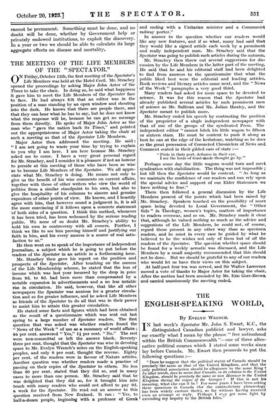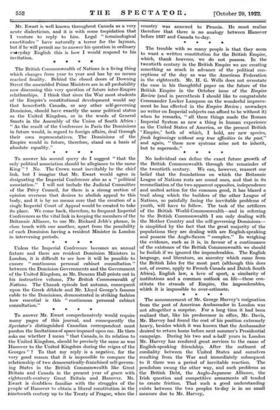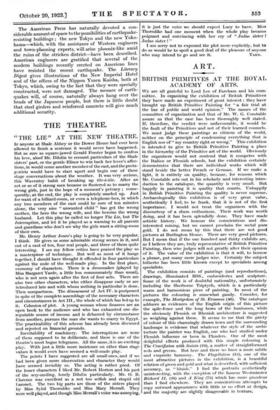THE
ENGLISH-SPEAKING WORLD,
By EVELYN WRENCH.
TN last week's Spectator Mr. John S. Ewart, K.C., the distinguished Canadian publicist and lawyer, asks me exactly what I mean by the phrase " free nationhood within the British Commonwealth "—one of three alter- native political courses which I stated some weeks since lay before Canada. Mr. Ewart then proceeds to put the following questions :- "Does he suggest that the political status of Canada should be precisely the same as that of the United Kingdom, and that the only political association should be allegiance to the same King ? In other words, does he mean that Canada, in its relation to the United Kingdom, should be precisely the same as was Hanover to the United Kingdom during the reins of the Georges f If this is not hie meaning, what else can it be Y For some years I have been asking these questions in Canada (for the contradictory phraseology has been widely current there), so far without having received even an attempt at reply. Perhaps I nrAy get some light by extending my Inquiry to the British Isles." Mr. Ewart is well known throughout Canada as a very acute dialectician, and it is with some trepidation that I venture to reply to him. Legal " terminological exactitudes " have naturally a terror for the layman, but if he will permit me to answer his question in ordinary clot ryday English this is how I would respond to his invitation. * * The British Commonwealth of Nations is a living thing which changes from year to year and has by no means reached finality. Behind the closed doors of Downing Street the assembled Prime Ministers are in all probability now discussing this very question of future inter-Empire relationships. I think that since the War most students of the Empire's constitutional development would say that henceforth Canada, or any other self-governing Dominion, should have exactly the same political status as the United Kingdom, or in the words of General Smuts in the Assembly of the Union of South Africa : " As the result of the Conference in Paris the Dominions in future would, in regard to foreign affairs, deal through their own representatives. The Dominions of the Empire would in future, therefore, stand on a basis of absolute equality." * * To answer his second query do I suggest " that the only political association should be allegiance to the same King " ? .No. The Crown must inevitably be the chief link, but I imagine that Mr. Ewart would agree in designating the Imperial Conference also as a " political association." I will not include the Judicial Committee of the Privy Council, for there is a strong section of opinion overseas that desires to abolish appeal to this body, and it is by no means sure that the- creation of a single Imperial Court of Appeal would be created to take its place. We come back, therefore, to frequent Imperial Conferences as the vital link in keeping the members of the Britannic Alliance, to use Mr. Richard Jebb's phrase, in close touch with one another, apart from the possibility of each Dominion having a resident Minister in London in intervening periods.
* * Unless the Imperial Conference becomes an annual fixture and there are resident Dominion Ministers in London, it is difficult to see how it will be possible to ensure " continuous personal cabinet consultation " between the Dominion Governments and the Government of the United Kingdom, as Mr. Duncan Hall points out in his instructive volume, The British Commonwealth of Nations. The Chanak episode last autumn, consequent upon the Greek debacle and Mr. Lloyd George's famous cable to the Dominions, demonstrated in striking fashion how essential is this " continuous personal cabinet consultation." * * * To answer Mr. Ewart comprehensively would require many pages of this journal, and consequently the Spectator's distinguished Canadian correspondent must pardon the limitations of space imposed upon me. He then asks me whether I mean " that Canada, in its relation to the United Kingdom, should be precisely the same as was Hanover to the United Kingdom during the reigns of the Georges " ? To that my reply_ is a negative, for the very good reason that it is impossible to compare the relationship of two democratically-franchised self-govern- ing States in the British Commonwealth like Great Britain and Canada in the present year of grace with eighteenth-century Great Britain and Hanover. Mr. Ewart is doubtless familiar with the struggles of the people of Hanover to obtain a liberal constitution in the nineteenth century up to the Treaty of Prague, when the country was annexed to Prussia. He must realize therefore that there is no analogy between Hanover before 1837 and Canada to-day.
The trouble with so many people is that they seem to want a written constitution for the British Empire, which, thank heavens; we do not possess. In the twentieth century in the British Empire we are creating something as much in advance of the political con- ceptions of the day as was the American Federation in the eighteenth. Mr. H. G. Wells does not overstate the case in his thoughtful paper on the future of the British Empire in the October issue of the Empire Review (and in parenthesis I should like to congratulate Commander Locker Lampson on the wonderful improve- ment he has effected in the Empire Review ; nowadays no writer on Imperial subjects can afford to be without it) when he remarks, " all these things made the Roman Imperial System as new a thing in human experience as the United States of America, or the present British Empire,' both of which, I hold, are new species, fresh beginnings without any true affinities in the past," and again, " these new systems arise not to inherit, but to supersede."
No individual can define the exact future growth of the British Commonwealth through the remainder of the twentieth century. We can, however, reassert our belief that the foundations on which the Britannic League of Nations rests are sound ones, and that in its reconciliation of the two apparent opposites, independence and united action for the common good, it has blazed a trail along which the builders of the other League of Nations, so painfully facing the inevitable problems of youth, will have to follow. The task of the artificers of the British World-Commonwealth—and in referring to the British Commonwealth I am only dealing with the Mother Country and the self-governing Dominions— is simplified by the fact that the great majority of the populations they are dealing with are English-speaking and possess the Anglo-Saxon " complex." In weighing the evidence, such as it is, in' favour of a continuance of the existence of the British Commonwealth we should be foolish if we ignored the imponderables. The English language, and literature, an ancestry which came from the British Isles for the most part (although this does not, of course, apply to French Canada and Dutch South Africa), English law, a love of sport, a similarity of institutions and a common outlook on life—these con- stitute the strands of Empire, the imponderables, which it is impossible to over-estimate.
* * * The announcement of Mr. George Harvey's resignation from the post of American Ambassador in London was not altogether a surprise. For a long time it had been realized that, like his predecessor in office, Mr. Davis, Mr. Harvey had found the cost of his position extremely heavy, besides which it was known that the Ambassador desired to return home before next summer's Presidential campaign. During his two and a-half years in London Mr. Harvey has rendered great services to the cause of English-speaking friendship. After the outburst of cordiality between the United States and ourselves resulting from the War and immediately subsequent to it there was a period of inevitable reaction. The pendulum swung the other way, and such problems as the British Debt, the Anglo-Japanese Alliance, the Irish question and competitive armaments all tended to create friction. That such a good understanding exists between the two peoples to-day is in no small measure due to Mr. Harvey. The American Press has naturally devoted a con- siderable amount of space to the possibilities of earthquake- resisting buildings ; the new Tokyo and the new Yoko- hama—which, with the assistance of Western engineers and town-planning experts, will arise phoenix-like amid the ruins of the stricken district—have been described. American engineers are gratified that several of the modern buildings recently erected on American lines have resisted the recent earthquake. The Literary Digest gives illustrations of the New Imperial Hotel and of the offices of the Nippon Yusen Kaisha, both at Tokyo, which, owing to the fact that they were specially constructed, were not damaged. The menace of earth- quakes will, of course, naturally always hang over the heads of the Japanese people, but there is little doubt that steel girders and reinforced concrete will give much additional security.












































 Previous page
Previous page